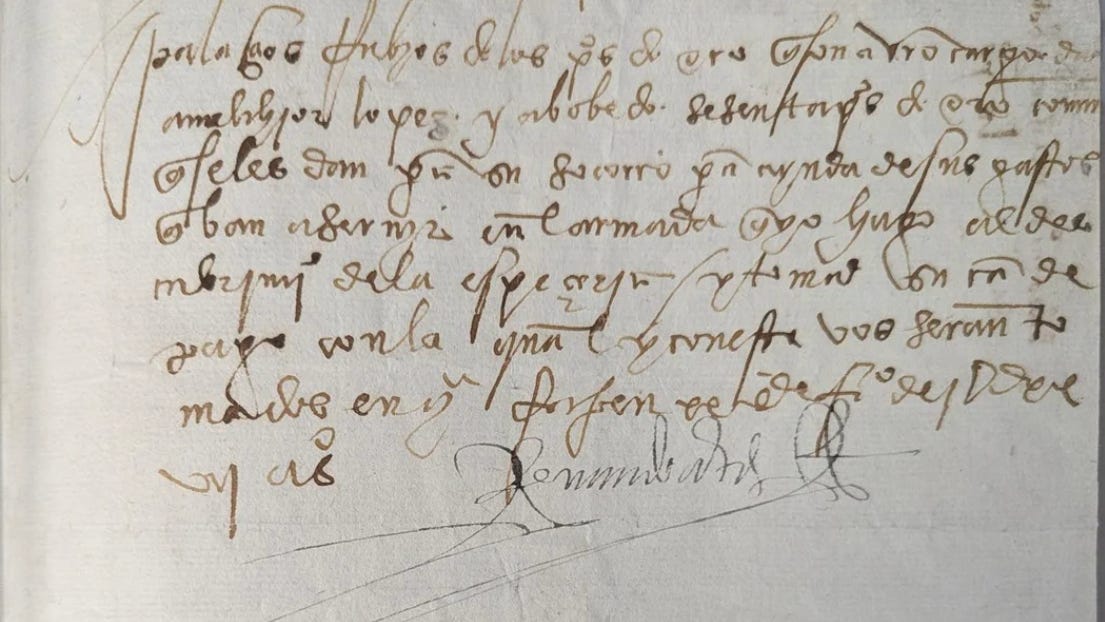Politics
FBI Repatriates 16th-Century Document Signed by Hernán Cortés

A 16th-century document signed by Spanish conquistador Hernán Cortés has been returned to Mexico after being missing for decades. The Federal Bureau of Investigation (FBI) announced the repatriation during a ceremony on August 13, 2023, highlighting its significance as a “priceless cultural artifact.” Special Agent Jessica Dittmer, who is part of the FBI’s Art Crime Team, confirmed that the document is the original manuscript page dated February 20, 1527, and believed to have been stolen during the 1980s or 1990s.
The FBI noted that no individuals will face charges related to the theft, as the document changed hands multiple times since its disappearance. Dittmer emphasized the importance of such pieces, stating, “Pieces like this are considered protected cultural property and represent valuable moments in Mexico’s history.”
This document marks the second return of a Cortés-related artifact by the FBI. In July 2023, the agency returned a letter from Cortés, which authorized the purchase of rose sugar, further illustrating the ongoing efforts to restore Mexico’s cultural heritage. The repatriation was made possible through collaboration between the FBI, the New York City Police Department, the U.S. Department of Justice, and the Mexican government.
Background on the Stolen Manuscript
The manuscript page was part of a collection housed in Mexico’s General Archive of the Nation. The document was catalogued alongside other historical records signed by Cortés. In October 1993, while archivists were microfilming the collection, they discovered that fifteen pages, including the one signed by Cortés, were missing. The FBI believes the theft occurred between 1985 and 1993, aided by a wax numbering system that helped identify the missing pages.
In 2024, the Mexican government sought the FBI’s assistance in locating the missing manuscript. Investigators determined that the document was likely in the United States, leading to a coordinated effort with the FBI’s Atlanta Field Office and the U.S. Attorney’s Office for the Southern District of New York to locate and authenticate the piece.
Significance of the Manuscript
The manuscript page details the payment of pesos of common gold for expenses related to Cortés’ expeditions, providing insight into the planning and logistics of his journey through territory that would become known as New Spain. Dittmer described it as historically significant, offering a complete account of the preparations for exploring uncharted territories in the early 16th century.
Cortés, who arrived in Mexico in 1519, forged alliances with local groups opposed to the Aztecs. This strategic maneuver allowed him to capture the Aztec capital of Tenochtitlan by 1521. The date of the repatriated document is particularly noteworthy, as it came shortly before one of Cortés’ top lieutenants was appointed co-governor of the newly conquered region, a critical moment in the establishment of royal and religious institutions that governed indigenous peoples until Mexico’s War of Independence.
The FBI continues to search for the remaining missing manuscript pages and encourages the public to provide any information that could aid in their recovery.
-

 Lifestyle3 months ago
Lifestyle3 months agoLibraries Challenge Rising E-Book Costs Amid Growing Demand
-

 Sports3 months ago
Sports3 months agoTyreek Hill Responds to Tua Tagovailoa’s Comments on Team Dynamics
-

 Sports3 months ago
Sports3 months agoLiverpool Secures Agreement to Sign Young Striker Will Wright
-

 Lifestyle3 months ago
Lifestyle3 months agoSave Your Split Tomatoes: Expert Tips for Gardeners
-

 Lifestyle3 months ago
Lifestyle3 months agoPrincess Beatrice’s Daughter Athena Joins Siblings at London Parade
-

 World3 months ago
World3 months agoWinter Storms Lash New South Wales with Snow, Flood Risks
-

 Science3 months ago
Science3 months agoTrump Administration Moves to Repeal Key Climate Regulation
-

 Science2 months ago
Science2 months agoSan Francisco Hosts Unique Contest to Identify “Performative Males”
-

 Business3 months ago
Business3 months agoSoFi Technologies Shares Slip 2% Following Insider Stock Sale
-

 Science3 months ago
Science3 months agoNew Tool Reveals Link Between Horse Coat Condition and Parasites
-

 Sports3 months ago
Sports3 months agoElon Musk Sculpture Travels From Utah to Yosemite National Park
-

 Science3 months ago
Science3 months agoNew Study Confirms Humans Transported Stonehenge Bluestones









